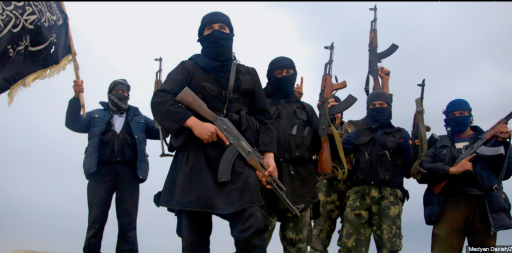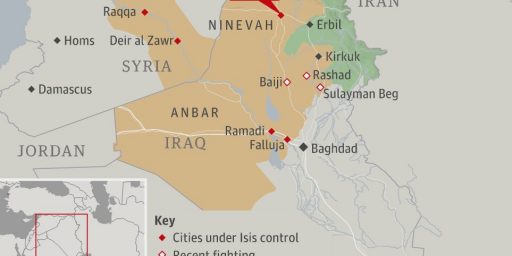The Present Danger
Joe Lieberman and Jon Kyl announce today the reconstitution of an old project:
The liberation of Iraq has important implications for the region and for the broader war on terrorism. The leaders of the Democratic and Republican parties have so far stood firm in their commitment to finish the job in Iraq and to fight to victory the war on terrorism. But that bipartisan consensus is coming under growing public pressure and could fray in the months ahead. Although the tide is turning in the war on terrorism, a political undertow in this country could wash out our recent gains. We must not let this happen.
To make sure it doesn’t, we are relaunching today the Committee on the Present Danger, a group of citizens of diverse political persuasions who will work to sustain and strengthen bipartisan support for the war on terrorism in Iraq and beyond. The Committee on the Present Danger was first formed at the dawn of the Cold War in 1950 to educate Americans about the growing threat of Soviet communism. Democratic senator Henry “Scoop” Jackson of Washington state revitalized the group in the mid-’70s; this time it was focused on working for a stronger stance toward the Soviets and the increased defense spending necessary to carry out that policy.
In this third incarnation, we intend to focus the committee on the present danger our generation faces: international terrorism from Islamic extremists and the outlaw states that either harbor or support them. The Sept. 11, 2001, terrorist attacks awoke all Americans to the capabilities and brutality of our new enemy, but today too many people are insufficiently aware of our enemy’s evil worldwide designs, which include waging jihad against all Americans and reestablishing a totalitarian religious empire in the Middle East. The past struggle against communism was, in some ways, different from the current war against Islamist terrorism. But America’s freedom and security, which each has aimed to undermine, are exactly the same. The national and international solidarity needed to prevail over both enemies is also the same. In fact, the world war against Islamic terrorism is the test of our time.
True to its history, the reborn Committee on the Present Danger will advocate strong policies both against international terrorists and their sponsors and in favor of freedom and security. We are committed to advancing this common cause on a bipartisan basis. In this war, our enemies do not distinguish between Democrats and Republicans. All Americans are the targets of their hate, because all Americans share the values they detest, the purpose that has defined America since the founders declared our independence — to secure our rights to life, liberty and the pursuit of happiness.
They’re right, of course. One can’t help wonder whether the Committee will help achieve these goals, though. While it’s true that there are those who don’t believe the threat from Islamic terror is our highest priority, they’re a distinct minority in Congress. The problem is in achieving consensus as to how to attack the problem. We aren’t anywhere close on that one.






“True to its history, the reborn Committee on the Present Danger will advocate strong policies both against international terrorists and their sponsors and in favor of freedom and security.”
One hopes they advocate some intelligent policies as well. But as long as we keep confusing “terrorism” as a means with “Islamic fundamentalism” as an end, we are not very close to an intelligent point of view on the whole situation.
Terrorism has to be fought, Islamic fundamentalism has to be refuted. It remains as true as ever that you change no one’s mind by putting a bullet through somebody else’s head.
You cannot fight what you cannot find, and we really seem to be no closer to finding and fighting “terrorists” than we were after the battle of Tora Bora. If we are, why does everyone have so many jitters about “terrorist attacks” during the election?
Which is why all this clamoring for a “strong” response is, at this point, largely empty wind. We are still looking for something significant to make a “strong” response to. That is what the current clamor about “intelligence failures” boils down to.
After all, we have already demonstrated we are willing to start wars over the problem. Two different ones in fact, that we still haven’t really finished. That’s about as “strong” as it gets.
Of course, if Joe and Jon are advocating that we start a third, a fourth, or a fifth one to make our response even “stronger”, they’d better come up with some ideas about how to fund and personel five wars at once. Even the infamous “neo-cons” haven’t had much to offer in that arena.
And, actually, I think that’s what Joe and Jon are really advocating, though they haven’t thought the matter through.
In the back of their minds, I suspect, is the model of Israel buldozing Arafat’s headquarters, shooting rockets from helecopters into some leader’s apartment or car, covertly assassinating dangerous individuals in foreign cities, and leveling the houses of people who have already blown something up to make their families homeless.
This is all spirited and “strong” stuff, of course. But its a lot easier to be effective with it when your problem is only the size of the West Bank and Gaza, and you have it surrounded.
When your problem is potentially worldwide, matters become stickier and the response needs to be smart as well as “strong”.